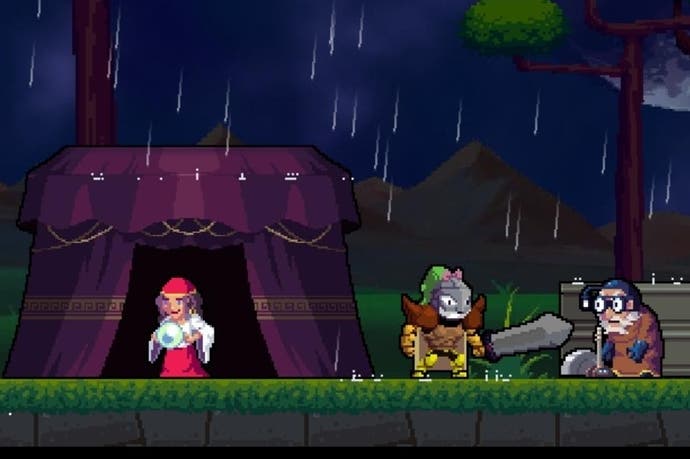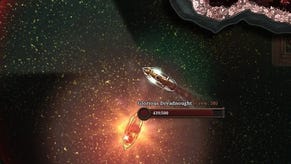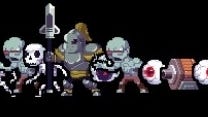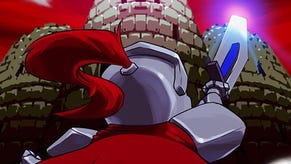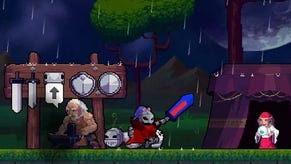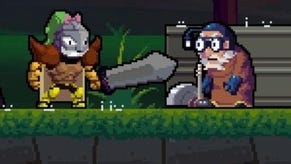The making of Rogue Legacy
What's behind Cellar Door Games?
I know you shouldn't judge games by their visuals but, upon seeing a screenshot of Rogue Legacy, I knew it would be up my street. And such shallowness on my part was soon confirmed in spades. Rogue Legacy's influences, from games as diverse as the Souls series to Spelunky, are obvious but the way it weaves these elements into something new creates a kind of oxymoron; an original steeped in nostalgia.
Developer Cellar Door Games are two brothers based in Toronto, Kenny and Teddy Lee, and Rogue Legacy is their biggest project to date - though the pair's debut did make something of a splash. "We started making games with Don't S**t Your Pants," laughs Teddy, "Which we made because the idea was so funny that eventually Kenny said 'I'm just gonna do it.' He didn't know much programming at the time but went in and did it, and the reception was so great that we wanted to do more."
It set the pair off making Flash games, but the quick turnarounds and fluctuating fortunes of that marketplace were a tough apprenticeship. "Some of our games would do well," says Teddy. "Like my First Quantum Translocator did OK, even though it didn't do so well publicly. But then the game afterwards I Have One Day made almost no money whatsoever. So it was up and down."
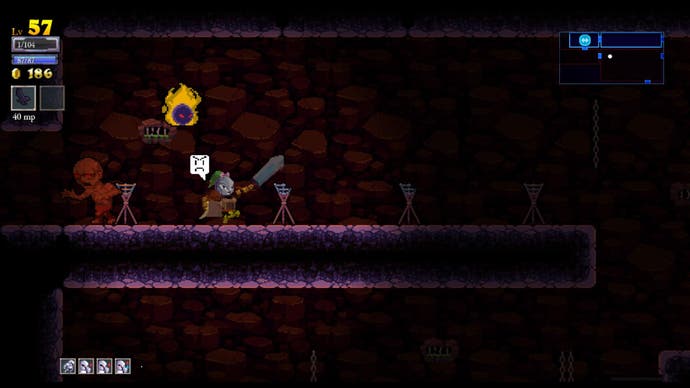
"That's the risk you take when you're making nothing but original games," adds Kenny. "They can do well or they can do poorly, but with Flash games it's a different kind of risk. With Rogue Legacy we spent 18 months developing it not knowing what's going to happen. Our biggest project previously was four months, so at about that point in Rogue Legacy we were wondering whether we'd make it to the end. Because on a game this large, at that point we'd gotten nowhere."
Rogue Legacy was meant to break free of that unrewarding treadmill, the flipside being that the brothers had to somehow fund its development. Teddy laughs when I ask how they managed. "I wouldn't say we're misers, but we save up money."
"We have no expenses," explains Kenny. "No cellphones, we stay at home working. But a lot of the funding actually came from Teddy because he was basically doing part-time jobs while I was working full time on this. We share an apartment and pinched pennies where we could. It wasn't the best situation for Teddy and he did amazing work. Sometimes I think I couldn't do what he did. There was a period of time, before Rogue Legacy, when I had a job between projects and I was just so spent. I couldn't work on any side projects when I got home. So that gave me a real appreciation of what he did."
What was the idea that would eventually become Rogue Legacy? "I'm not sure if we're the same as other designers in the sense that we don't plan very far ahead," says Teddy. "We're terrible at that. The super original idea came from Demon's Souls and Dark Souls - we wanted to make a 2D version of it. The very first version running had no procedural generation, it was all interconnected, it had treasure chests, you died and you started from the very beginning spawn point."
Kenny mentions this version was also proving too expensive. "That was another issue," laughs Teddy. "It had its own twist on Demon's Souls, which was a customisable combat system, but then we realised if we spent a year on it we'd have like one-tenth of the game done. So we scrapped it. Because we do design to budget - we like to make something small and then abuse it as much as possible [laughs] so a procedural castle is perfect!"

The procedurally generated castle of Rogue Legacy most obviously calls to mind Spelunky, but the two games go down very different paths. Nothing is as devastating as making a deep run in Spelunky and losing it all to a stupid risk. Rogue Legacy has something of the same but is more forgiving, thanks mainly to hundreds of incremental but permanent player upgrades. "We definitely wanted to make it easier," says Teddy. "That was driving us because we don't like these super-punishing games - I mean we like them, but we think there's space there to be kinder to the audience. So that's where we came up with the gold system where you have to spend between runs or you lose it all."
The gold is used for three different systems; character and class upgrades, blacksmith upgrades, and ability-based runes. One of the game's beauties is how these systems layer atop the procedurally generated core, letting you fiddle with different load-outs and focus builds on particular classes.
"We had two economies at one point," says Teddy. "So you'd pick up gold but also experience - we had a local and a meta experience system giving you stat bonuses. When we were working on that cut it was because it was making the game messy, and what was the solution? I spent two days wrangling over it and the decision was - cut experience entirely. It felt like taking out a huge, dangerous chunk of the game which was already rigged in."
Such streamlining, however, seems like exactly what Rogue Legacy needed; this is a game about short sessions, where the persistent element means almost every run nets you something concrete. "The goal of the game was for two to five minutes runs because that's what we like," says Teddy. "We don't have the time to really play these longer games, and that kind of geared itself into the upgrades and training. If you've played a game like the Binding of Isaac, it's great but it takes twenty minutes to build up to where it can go - and we needed to cut all of that out, kind of up-front it. So that's how the genealogy system came in."
"The super original idea came from Demon's Souls and Dark Souls - we wanted to make a 2D version of it."
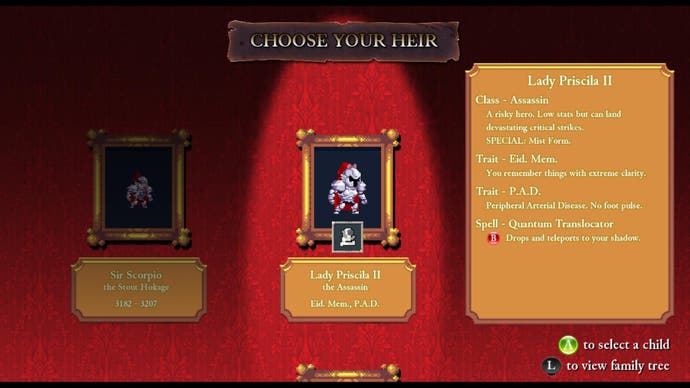
What that means is each run gives you the option of three classes, from a much larger pool. It's another of the elegant touches Rogue Legacy is full of, and my favourite's the architect - a figure who, between runs, gives you the option to 'freeze' the castle's layout. I wonder what didn't make it?
"There's one thing Kenny's upset about," laughs Teddy. "The structure was one of the last things to come together, because we were really tinkering. And one of the original ideas was the mega castle. So because with our game we can just change a few numbers and expand it in size, we could make a persistent castle over a thousand rooms large. It's pretty cool, right? Except at the start of the game when it's building it takes about three minutes to construct it. It was great but we probably spent too much time trying to rig the mega castle into the game proper."
"I remember taking that out and it hurt," says Kenny. "I wanted the big persistent castle somewhere because I wanted the idea of exploration. You slowly start to uncover the castle as you progress and get stronger. The alternative I guess was the architect. It wasn't really what I wanted but Teddy is the creative designer so he does get the final say, and even though I fought tooth and nail for it I'll say it was the right decision to take it out. But who knows about the future."
Who knows indeed. One senses that the days of scraping by are over for Cellar Door Games - and good luck to them, because Rogue Legacy earns every shiny gold piece. "With Flash we would work for three months, make no money, scrimp by, and then maybe or maybe not make enough to pay for that time," says Kenny. "Then we'd work on another game in the same way. You always get payment afterward, and you'd never quite make enough from the previous game to feel confident in making the next one - for us it always felt like a tightrope walk, and we could fall at any time. Rogue Legacy has made enough so we can plan future projects without having to worry about how little we need to spend on food."
Teddy laughs, and adds the finishing touch. "Honestly it's made me so happy, because we can make a new game that can bomb."
